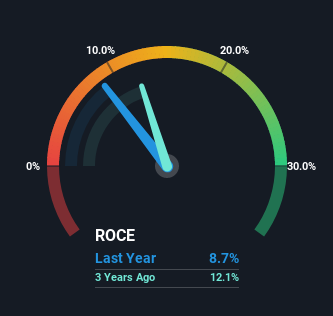What are the early trends we should look for to identify a stock that could multiply in value over the long term? Ideally, a business will show two trends; firstly a growing return on capital employed (ROCE) and secondly, an increasing amount of capital employed. Basically this means that a company has profitable initiatives that it can continue to reinvest in, which is a trait of a compounding machine. However, after briefly looking over the numbers, we don't think Bakkavor Group (LON:BAKK) has the makings of a multi-bagger going forward, but let's have a look at why that may be.
Return On Capital Employed (ROCE): What is it?
If you haven't worked with ROCE before, it measures the 'return' (pre-tax profit) a company generates from capital employed in its business. To calculate this metric for Bakkavor Group, this is the formula:
Return on Capital Employed = Earnings Before Interest and Tax (EBIT) ÷ (Total Assets - Current Liabilities)
0.087 = UK£95m ÷ (UK£1.5b - UK£416m) (Based on the trailing twelve months to December 2021).
Therefore, Bakkavor Group has an ROCE of 8.7%. Ultimately, that's a low return and it under-performs the Food industry average of 11%.
Check out our latest analysis for Bakkavor Group

In the above chart we have measured Bakkavor Group's prior ROCE against its prior performance, but the future is arguably more important. If you'd like to see what analysts are forecasting going forward, you should check out our free report for Bakkavor Group.
What Can We Tell From Bakkavor Group's ROCE Trend?
When we looked at the ROCE trend at Bakkavor Group, we didn't gain much confidence. To be more specific, ROCE has fallen from 13% over the last five years. However it looks like Bakkavor Group might be reinvesting for long term growth because while capital employed has increased, the company's sales haven't changed much in the last 12 months. It's worth keeping an eye on the company's earnings from here on to see if these investments do end up contributing to the bottom line.
What We Can Learn From Bakkavor Group's ROCE
In summary, Bakkavor Group is reinvesting funds back into the business for growth but unfortunately it looks like sales haven't increased much just yet. And in the last three years, the stock has given away 16% so the market doesn't look too hopeful on these trends strengthening any time soon. In any case, the stock doesn't have these traits of a multi-bagger discussed above, so if that's what you're looking for, we think you'd have more luck elsewhere.
Bakkavor Group does have some risks though, and we've spotted 3 warning signs for Bakkavor Group that you might be interested in.
If you want to search for solid companies with great earnings, check out this free list of companies with good balance sheets and impressive returns on equity.
Valuation is complex, but we're here to simplify it.
Discover if Bakkavor Group might be undervalued or overvalued with our detailed analysis, featuring fair value estimates, potential risks, dividends, insider trades, and its financial condition.
Access Free AnalysisHave feedback on this article? Concerned about the content? Get in touch with us directly. Alternatively, email editorial-team (at) simplywallst.com.
This article by Simply Wall St is general in nature. We provide commentary based on historical data and analyst forecasts only using an unbiased methodology and our articles are not intended to be financial advice. It does not constitute a recommendation to buy or sell any stock, and does not take account of your objectives, or your financial situation. We aim to bring you long-term focused analysis driven by fundamental data. Note that our analysis may not factor in the latest price-sensitive company announcements or qualitative material. Simply Wall St has no position in any stocks mentioned.
About LSE:BAKK
Bakkavor Group
Engages in the preparation and marketing of fresh prepared foods in the United Kingdom, the United States, and China.
Adequate balance sheet with moderate growth potential.
Similar Companies
Market Insights
Community Narratives



